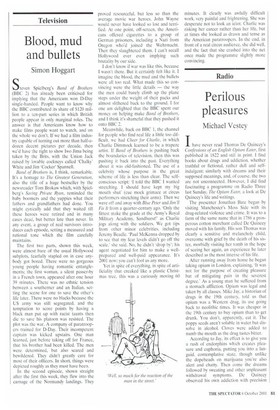Radio
Perilous pleasures
Michael Vestey
Ihave never read Thomas De Quincey's Confessions of an English Opium Eater, first published in 1822 and still in print. I find books about drugs and addiction, whether truthful or fictional, rather dull and selfindulgent; similarly with dreams and their supposed meanings, and, of course, the two are not unconnected. However, I did find fascinating a programme on Radio Three last Sunday, The Opium Eater, a look at De Quincey's life and writings.
The presenter Jonathan Bate began by visiting Manchester's Moss Side with its drug-related violence and crime. It was to a farm of the same name that in 1786 a prosperous cotton merchant called De Quincey moved with his family. His son Thomas was clearly a sensitive and melancholy child, overcome with grief by the death of his sister, morbidly visiting her tomb in the hope of seeing her again, an experience he later described as the most intense of his life.
After running away from home he began taking opium in London. explaining, 'It was not for the purpose of creating pleasure but of mitigating pain in the severest degree.' As a young man he suffered from a stomach affliction. Opium was legal and taken by all classes. Mike Jay, a historian of drugs in the 19th century, told us that opium was a Western drug, its use going back to neolithic times. It was cheaper in the 19th century to buy opium than to get drunk. You don't, apparently, eat it. The poppy seeds aren't soluble in water but dissolve in alcohol. Cloves were added to numb the mouth as the drug tastes bitter.
According to Jay, its effect is to give you a rush of endorphins which creates pleasure and euphoria, putting you into a languid, contemplative state, though unlike the dopeheads on marijuana you're also alert and chatty. Then come the dreams followed by sweating and other unpleasant withdrawal symptoms. De Quincey observed his own addiction with precision
and, needing the money, wrote about it for a weekly magazine. His writings became a bestselling book which influenced doctors, adventurers, writers such as the Brontes, Poe and Baudelaire, and Berlioz, who included a musical opium trip in his Symphonie Fantastique. One of De Quincey's biographers traced connections between the book and Freud, who later used hypnosis and cocaine to recover memories. In fact, long before Freud was born, De Quincey in his unfinished Suspiria de Profundis and The English Mail Coach wrote about what he thought was the significance of childhood experiences reappearing in different forms in dreams.
Opium was eventually banned in Britain after the government became concerned that it would affect efficiency in the factories. As Jay reminded us, the pharmaceutical industry refined it and also came up with a drug called diamorphine, which they renamed heroin as it was 'a heroic remedy'. Just the drug that Harold Shipman used to kill his patients. This century, of course, inspired by De Quincey, Huxley and others, writers and Beat poets created a druggie genre which I must say I find rather boring, though I can see why De Quincey's opium-taking autobiography created such a stir at the time.
Still, the opium didn't seem to have done him much harm. He wrote mostly for magazines to support his family and died at the age of 74. While it is true, as someone in the programme said, that alcohol and tobacco are more dangerous than opium, I think only if they're taken to excess. I suspect marijuana is pretty safe though I don't really know as opinions conflict so much and it's difficult to know what to believe.
We are, however, reminded daily of the consequences of mass drug-taking in Britain, particularly in what must have once been, in De Quincey's childhood, the rural idyll of Moss Side. The programme didn't forget to mention that, sooner or later, individuals have to confront their drug addiction or perish, as a former colleague of mine did recently. Whatever moments of pleasure he had experienced seem to me to be outweighed by what happened to him in the years leading to his premature death.
Unfortunately, De Quincey still inspires some authors, such as the middle-aged American who wrote a recent anonymous article in Granta about his consumption of Ecstasy tablets. When I heard an extract read on this programme it sounded at first rather comical until I thought of the young people who've died from taking it or had their minds altered by it: 'Ecstasy is delicious. Or put another way, Ecstasy is delicious and I recommend highly, loudly and long that everyone whose health, physically and mentally, does not contra-indicate or preclude its ingestion, ought to ingest it.' I can't say I'm surprised that he resisted attempts by the programme to reveal himself.



































































































 Previous page
Previous page